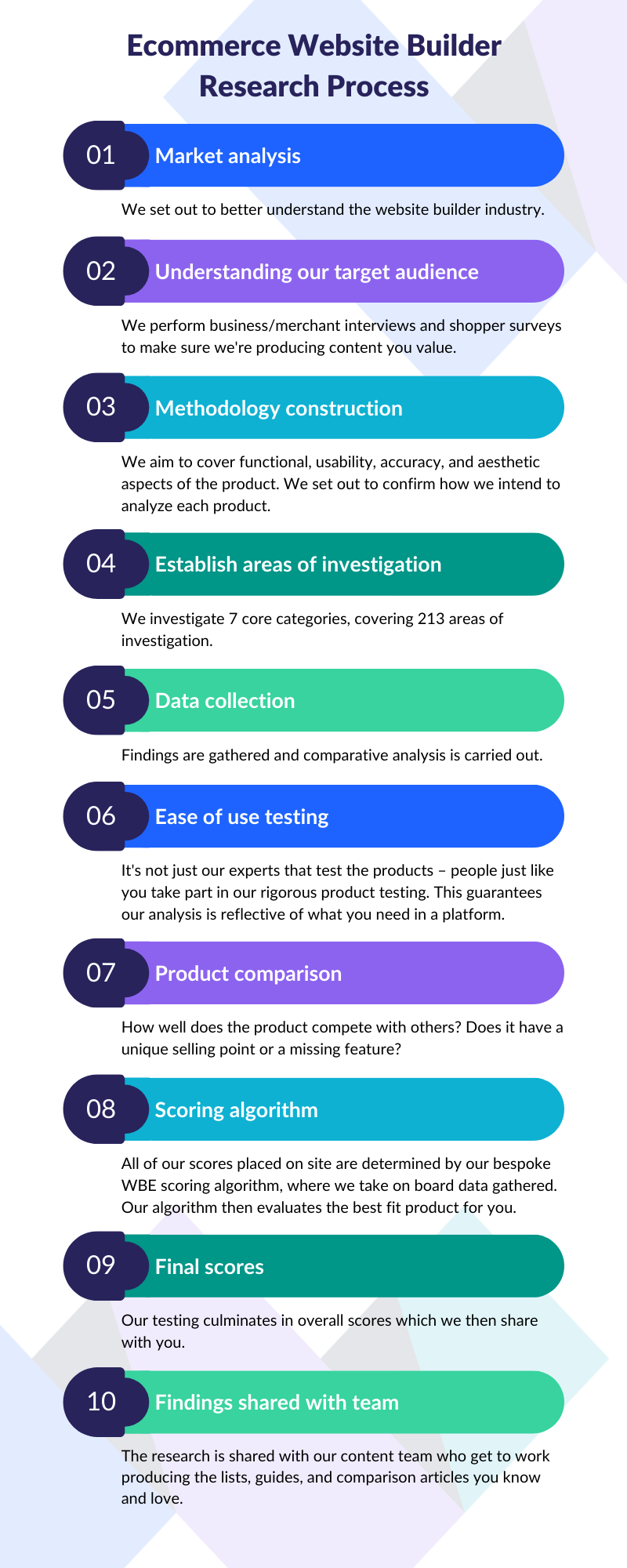How We Conduct Our Ecommerce Website Builder Research
If you click to purchase a product or service based on our independent recommendations and impartial reviews, we may receive a commission. Learn more
We know building your own online store can be a daunting task. Where do you start? How much does it cost? How difficult will it be? What features do you need to thrive?
That’s where we come in. Website Builder Guide is the number one resource for information about how to get online. We don’t just try platforms – we carry out professional, in-depth research, and really put them to the test.
When it comes to building an online store, the easiest and most cost-effective option is to use an ecommerce website builder. Website builders are online platforms that provide you with the framework and support you need to design your own ecommerce site.
Naturally, some are better than others. We’ve tested the best ecommerce website builders around to bring you a definitive answer as to which one is best for your needs. But how do we know which providers to recommend? Read on to see how we conduct our ecommerce website builder research.

Because of this, we’ve never sold rankings or positions to companies, and we can guarantee you that we never will. So, how do we make any money? Website Builder Guide’s income comes via referral commissions and affiliate links across our pages. If you follow one of these links, find you’re happy with your chosen builder, and sign up to the platform, that’s when we get paid – it’s entirely in your hands if we get paid or not!
Our Research Process
We’re called Website Builder Expert for a reason – we’ve got years of experience in the industry, testing builders and platforms thoroughly. After all, we want to bring you reliable information and make sure we’re talking about the factors that matter most to you.
Our research process involves a lot of steps, and after hours of work, the result is fair and data-driven ratings. We cover the good but also don’t shy away from the bad, so you can trust our recommendations to be impartial.
Get an overview of our process below:

As you can see, we research seven core areas of investigation when testing ecommerce website builders:
- Website features
- Sales features
- Design functionalities
- Value for money
- Help and support
- Customer satisfaction
- Ease of use
Pretty similar to our website builder research process, but with an additional focus on ecommerce and an emphasis on what matters most to small businesses.
These seven categories are then broken down even further, making up a total of 213 sub-categories where we investigate things like template options and SEO more closely. Gathering scores from each test gives us a total rating for that core area of investigation, and once we have every score, we can calculate the overall score for that ecommerce builder.
Another key stage of our research process is our ease of use testing. We bring in everyday users to test the builders and platforms for us, giving us valuable insight into how user-friendly they are, what they like, and what they dislike.
Of course, this is just a general overview of how we bring you the best recommendations, but we’ll explain exactly what’s involved with each area of investigation below:
Ease of Use
By its very nature, an ecommerce website builder should make creating an online store simple and accessible for everyone. Understandably, that’s not always the case, and some builders are easier to use than others.
Does the builder have a drag-and-drop editor? Will your website be restricted to block sections? Can you find what you need in the backend?
To test this properly, we called in a group of everyday people – from total beginners to experienced builders – to create their own online store using the assigned platform. We gave them a detailed task sheet and asked them to score how easy or difficult everything was to carry out.
From there, we were able to calculate an overall ease of use score for each ecommerce website builder. We also get great feedback on what works well for each platform, and what areas need improvement.
Sales Features
Because we’re looking at ecommerce website builders specifically, it’s important that our areas of investigation reflect this. Sales features – any attribute or tool that helps merchants sell products – are incredibly important for online stores, so we separated them from our general website features category.
And there are a lot of features to cover. Here are just a handful of the sub-categories we investigate:
- Security – Does the builder keep your website and customer data safe from harm?
- Multi-channel integration – Can you link social channels and marketplaces to your site?
- Sales type – What types of products can be sold through the builder? Physical? Digital? Services?
- Payment options – Can you accept payments from the major providers?
- Transaction fees – What kind of transaction fee will you be charged and does your plan cover it?
- Inventory – How many products can you sell and what inventory management tools are provided?
- Mobile app – Can you manage your online store on the go?
- Shipping options – What tools are you provided with to help with shipping?
- Promotion and discount codes – Does the builder provide promotional elements and are discount codes supported?
Our 2023 research found that every ecommerce website builder has made improvements to their sales features since last year, so it’s important to look at the individual factors closely before committing.
Website Features
A website feature refers to more standard attributes that may not have a direct impact on sales, but are nonetheless central to a website’s success. These tools will help you manage, promote, and run your site effectively. When testing, we examine the quality of the feature alongside other aspects, such as whether the feature is built-in or only accessible in the app market.
Here are a handful of the sub-categories we investigate:
- Marketing – Does the builder provide built-in marketing features?
- Internationalization – Can you sell globally? How many languages and currencies are supported?
- Domains – Do you get a free domain? How much does a domain cost? Can you transfer an existing domain name?
- Storage space – How much storage space is provided? At what price does the builder offer unlimited storage?
- SEO – How does the builder optimize your website for search engines?
- App integration – Does the builder have an app market? How many apps are available?
- Blogging – Can you add a blog to your website? What blogging functionalities are provided?
- Site speed – How well does the provider perform? Will it keep your website running smoothly?
Design Functionality
The quality of web design can be a subjective matter, but if there’s one thing everyone can agree on, it’s that your website needs to look good to attract visitors. That’s why we enlisted the help of industry-leading experts to identify the key components of web design.
With this information, we could formulate a list of criteria that each platform’s templates and design elements had to meet. Not only do we look at the templates and overall aesthetics closely, but we examine each builder’s design flexibility (can you change a template after publishing?), omnichannel design options, image editor, mobile reformatting, and more.
Value for Money
Our value for money algorithm changed in 2023 due to every ecommerce website builder increasing its prices. Given the current economic climate, this is an understandable shift in the industry and we want to make sure our readers are getting good value out of their builder of choice.
We now place greater emphasis on “features vs price” and whether or not a builder offers a free trial or plan. Having the cheapest plan just won’t cut it anymore – it’s important that the quality of features on offer matches the price you pay.
Help and Support
When looking at help and support, it’s important to assess both the quality of support on offer and also the different channels you can seek help through. Some people may prefer support via email, while others may want a more immediate interaction, such as a phone call or live chat.
When examining each builder, we look at:
- Types of help and support – Can you get help through email, phone, live chat, social media, community channels, or tickets? Is it available 24/7 or at set times?
- Payment – How much do you have to pay to receive the best support?
- Knowledge Center – Does the builder provide useful and accurate information?
- Restore options – Is there an autosave feature when editing? Can you easily restore your site if needed?
Customer Satisfaction
The final area of investigation is customer satisfaction. For this, we took a collection of information from our previous categories and created a score based on factors that customers are particularly interested in. For example, value for money and UX are considered, as well as a few new areas, such as market analysis and brand recognition. Are customers aware of the product? Is it rated highly within the industry? Can it compete with its competitors?
And, from our ease of use testers, we get a score based on how likely it is they’d recommend the ecommerce website builder to others. After all, customers trust other customers, and this score gives you a good insight into how regular users view the builder.
Meet the Researchers

Natasha Willett – As Website Builder Guide’s Lead Researcher, Natasha has clocked over 9,600 hours of product research and testing to bring you fair recommendations based on data. For the best ecommerce website builders, this involved analyzing 213 areas of investigation. Natasha has expert credentials in research and is fully qualified with a BSc, Ma, and MMRS. She’s worked as a mixed method researcher for the last nine years (with five years at Website Builder Guide), and she’s a member of the prestigious Market Research Society.
Website Builder Guide aims to provide you with honest data. That’s why we conduct our own research and obtain direct, personal insight. Analyses and graphics in this article are based on authentic sources, cross-validated by our in-house experts. We take great care to ensure the information we publish is reliable and accurate. However, WBE takes no responsibility for any inaccuracy in information supplied to us by users, research participants, or other entities.
Please note the insight contained within this article is for general information purposes only. We’re happy to answer any questions you may have about this article and its supporting research. For further information, please leave a comment and we’ll get back to you as soon as possible.

4 comments